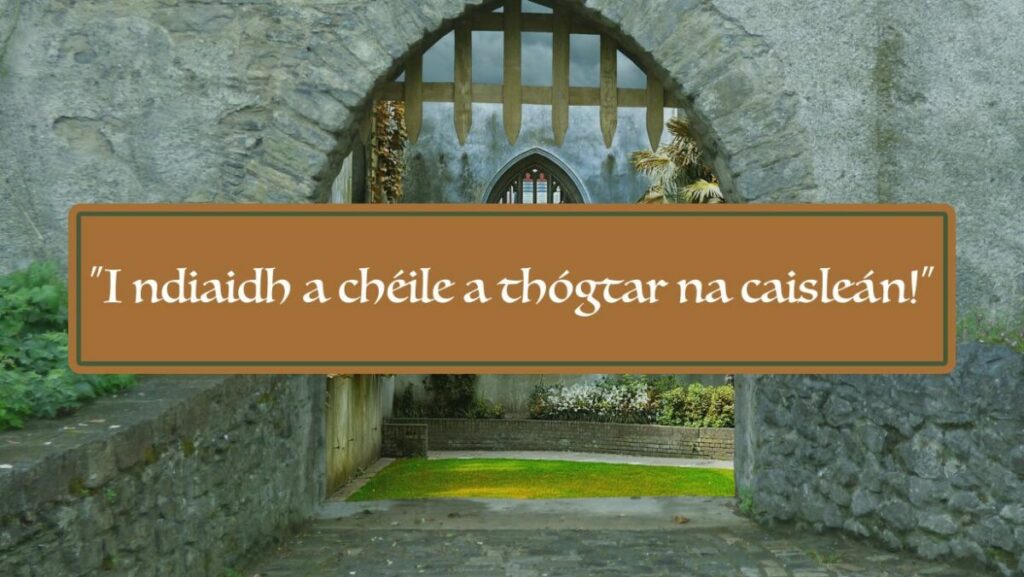
By Bob Carney
In the September issue of iIrish, we covered some of what we study in our beginner Speak Irish class. I’m happy to tell you that once again we have a number of new students and almost all of our former students have returned. I love that space is becoming an issue for us!
This month I would like to share a few things that I covered during the pandemic, when we did not have a printed edition. We’ll also cover a tiny bit of grammar, but mostly continue with our blossoming conversational skills.
The verb Tá Present Tense
Tá (taw) is/am/are
An bhfuil? (un will) question form is?/ am?/are?
Níl (neel) negative form is not/ am not/ are not
Nach bhfuil? (noch will) negative question form isn’t/am not/ aren’t
To answer questions posed with the tá in the present tense, you respond with tá (yes) or níl (no)
Past tense of tá
Bhí (vee) was
An raibh (un riv) was?
Ní raibh (nee riv) wasn’t
Nach raibh (noch riv) wasn’t?
To answer questions posed in the past tense you use bhí (yes) or ní raibh (no)
Future tense of tá
Beidh (bay) will be
An mbeidh? (un may) will be
Ní bheidh (nee vay) won’t be
Nach mbeidh (noch may) won’t be
To answer questions posed in the future tense you use beidh (yes) ní beidh (no)
Irish has no direct word for yes or no to cover all questions, instead you must use the appropriate version of the verb used in posing the question. If you would like to respond in Irish to a question posed in English, I would suggest you use sea (shah) for yes, and ní hea (nee hah) for no.
It is a good practice to use any Irish you have in day to day conversations in English. It helps you remember what you have learned if you use it regularly. I like to follow up by saying “I’m studying Irish and that means…in English.”
You may have noticed spelling and pronunciation differences in the examples above even though the meaning is the same. Words are changed due to grammatical rules that we don’t need to get into at this time, just be aware that they exist. The main purpose of any language is communication, when we learned English as children we didn’t know what a noun or verb was but still managed to express ourselves. As adults it can be difficult for us to grasp this approach, but it is better to stick to a building block method.
Mé (may) I
Tú (too) you
Sé (shay) he or it
Sí (shee) she or it
Muid (mwidj) we
Sibh (shiv) y’all
Siad (shee-ud) they
Go maith (guh mah) good or well
Go brea (guh braw) fine
Go h-iontach (guh hee-un tahk) wonderful
Go dona (guh daw-na) bad or not well
Ceart go leor (kyart guh lore) right enough or ok
Basic Irish sentence structure has the verb first followed by the noun or pronoun, then the adjective. Tá mé go maith. (I am good) Nach bhfuil muid go h-iontach? (Aren’t we wonderful?) Now try building a few sentences on your own, pick a verb, then a pronoun and lastly your adjective. As you can see there are quite a few possibilities.
The weather is always a topic for conversation in Ireland and here, for the next few months. With just a little new vocabulary we can really expand our conversational skills
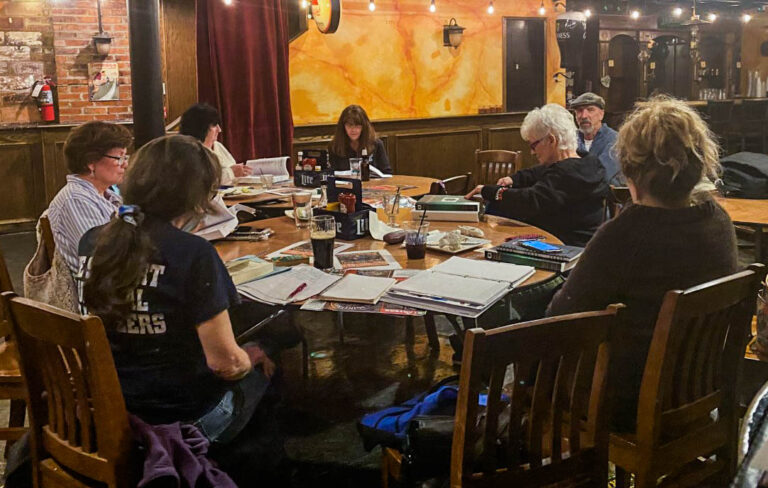
An aimsir (un am-sheer) the weather
An lá (un law) the day
An oíche (un ee-hah) the night
Fuar (foo-uhr) cold
Te (tcheh) hot
Fliuch (flyukh) wet
Tirim (tchih-ruhm) dry
Scamallach (skom-uh-lahk) cloudy
Grianmhar (gree-un-wer) sunny
Agus (ah-gus) and
Ach (ahk) but
Inniu (in-yoo) today
Anocht (uh-nocht) tonight
Remembering our basic Irish sentence structure, verb- pronoun or noun -adjective, we can easily say Tá an lá go brea. The day is fine.
Tá an oíche fuar ach tirim. The night is cold but dry.
Nach bhfuil an aimsir fliuch agus scamallach? Isn’t the weather wet and cloudy?
Níl an aimsir te inniu. The weather isn’t hot today.
Tá an oíche fuar anocht. The night is cold tonight.
Once again you can see there are many possible combinations using only the vocabulary here. Combined with September’s lesson a complete conversation is possible. If you recall, we talked about how you can ask someone how they are, using all three of the regional dialects. You can use those same phrases to inquire about the weather.
Cén chaoi a bhfuil tú? (kay hee will too) How are you? (Connacht)
Cén chaoi a bhfuil an aimsir? (kay hee will un am-sheer) How is the weather?
Conas atá tú? (kun-us ah-taw too) How are you? (Munster)
Conas atá an lá? (kun-us ah-taw un law) How is the day?
Cad é mar atá tú? (kuh-jay mar ah-taw too) How are you? (Ulster)
Cad é mar atá an aimsir anocht? (kuh-jay mar ah-taw un am-sheer ah-nocht)How is the weather tonight?
One very important tool in learning any language is hearing it. My phonetic spellings are my own interpretations of how I hear the words, and not necessarily the way another would.
The on-line dictionary teanglann.ie is a free dictionary that includes an audio section where you can hear the word spoken in all three regional dialects. Although I have numerous Irish dictionaries on my desk, teanglann is the one I use the most, it’s on my phone’s home screen and is always with me.
Between September’s column and this one there is a lot of information, but take it a step at a time, learn a word or phrase or two and use it in your daily conversations, next day add another or two, you’ll be amazed how quickly your new Irish vocabulary will grow.
“I ndiaidh a chéile a thógtar na caisleán!”
“Stone by stone builds the castle!”
Find this and all of Bob’s Speak Irish columns here.

*Bob Carney is a student of Irish language and history and teaches the Speak Irish Cleveland class held every Tuesday at PJ McIntyre’s. He is also active in the Irish Wolfhound and Irish dogs organizations in and around Cleveland. Wife Mary, hounds Rían, Aisling and Draoi and terrier Doolin keep the house jumping. He can be reached at [email protected]



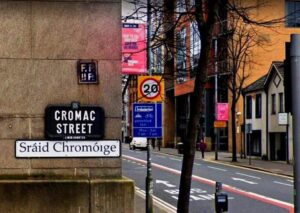
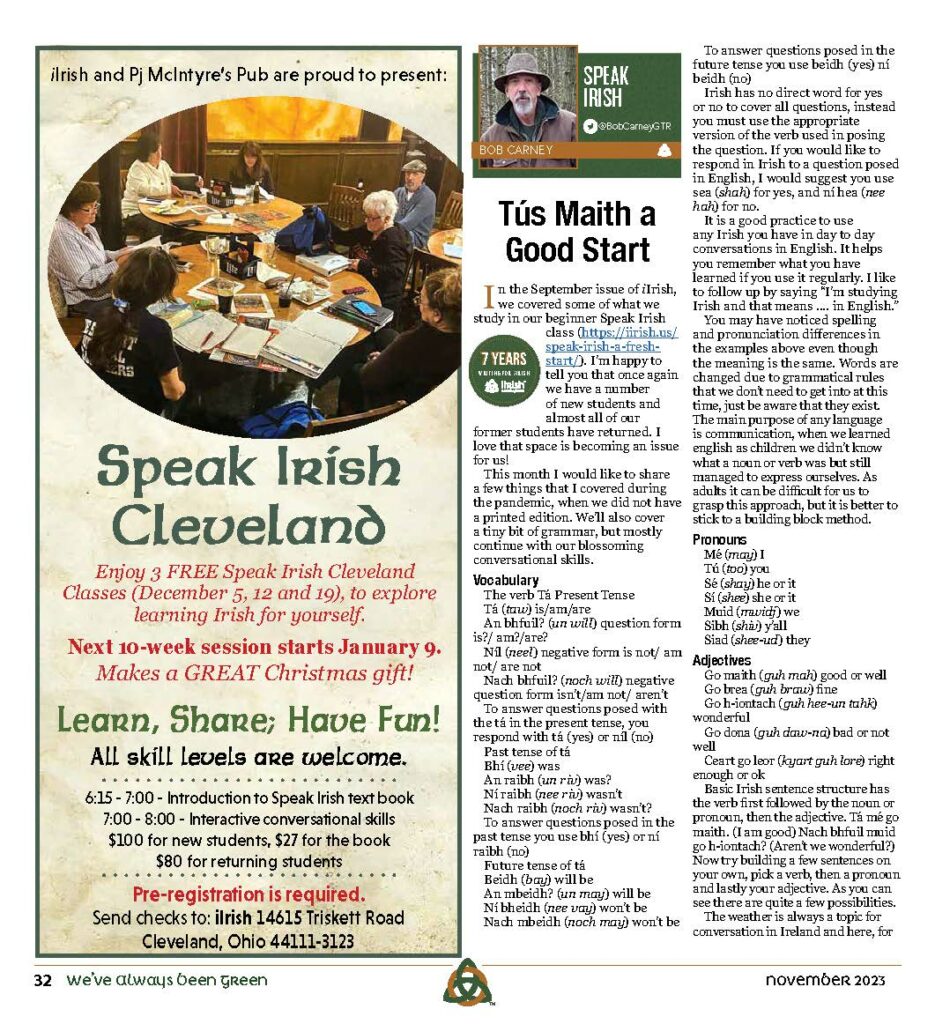
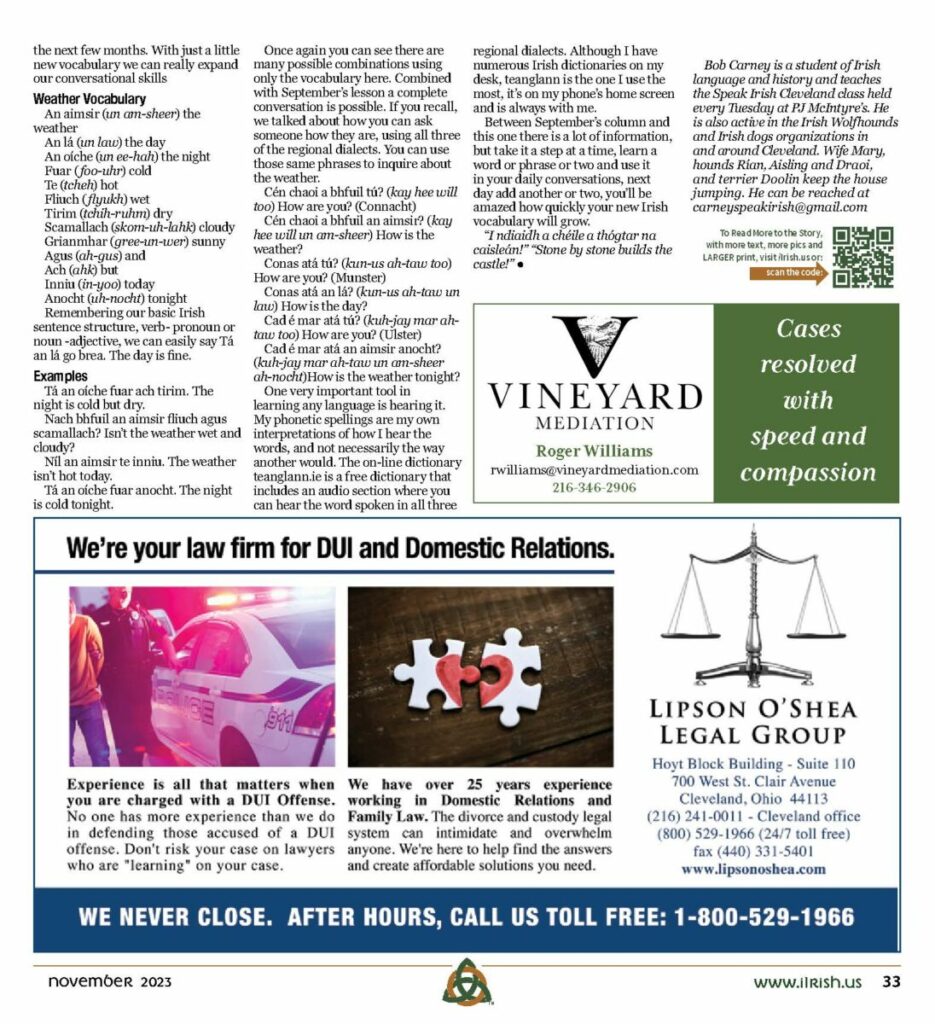

Monthly newsmagazine serving people of Irish descent from Cleveland to Clearwater. We cover the movers, shakers & music makers each and every month.
Since our 2006 inception, iIrish has donated more than $376,000 to local and national charities.
GET UPDATES ON THE SERIOUS & THE SHENANIGANS!